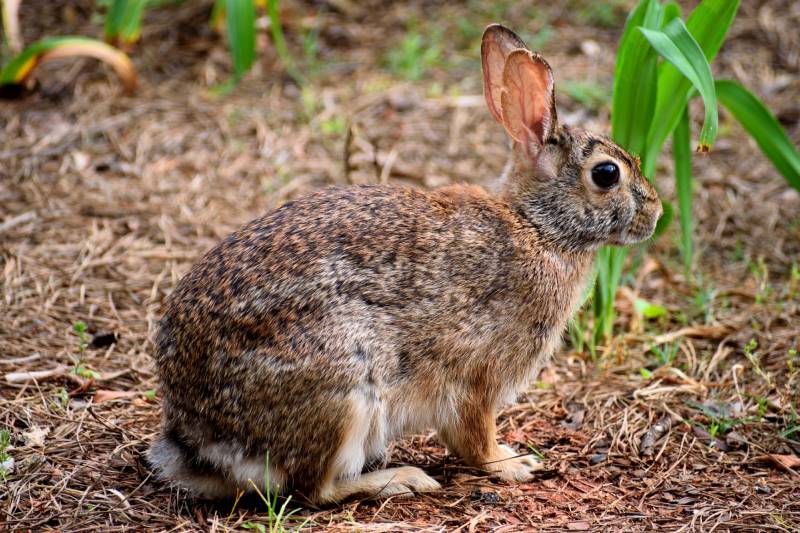During summer and spring you probably see rabbits enjoying all the green goodness in your yard.
But, do rabbits hibernate during those cold winter months?
You probably realize that you see those rabbits a whole lot less as the days get colder.
Is hibernation the reason or do rabbits migrate?
Let’s take a look at the instincts of the wild rabbit and see if they do in fact hibernate and how they handle those cold winter months!
Do Rabbits Or Bunnies Hibernate When It Gets Cold Outside?

Rabbits do not hibernate in the winter or any other time of year.
They are out and about all times of year looking for food sources!
If you do not see rabbits in your yard when it is colder or snows, it may mean they found a better food source elsewhere.
What Is Hibernation?
Hibernation is when animals go into a deep sleep during the cold weather months to save energy due to lack of food resources available.
The animal goes through a process where their metabolism, heart rate, body temperature and breathing will slow to conserve energy.
Bears are the most notorious hibernating animals and spend months in hibernation.
Fun fact: rabbits will typically have a body temperature of 102 to 103 degrees F and if it falls below this they may begin to go into the beginning stages of hypothermia which is a large part why hibernation is not right for them!
Where Do Wild Rabbits Go In The Winter?
Wild rabbits of any species do not go anywhere different than they normally due during winter.
Rabbits stay around in the same places they do in the spring and summer but may come out a little less often.
They can often be found digging holes or finding warm places to rest when it gets very cold.
They also will be finding shelter from predators which may require them to be on the hunt for thick bushes, evergreen trees or walled buildings to hide under so that they cannot be easily seen.
If you do notice them less in your yard it may due to them just staying out of the harsh cold or trying to stay hidden from predators.
Many rabbit species will dig their own little dens or burrows to spend much of their time in, but one species that is different are the Eastern Cottontail Rabbits.
The Eastern Cottontail Rabbit is what I see most often in my yard here in NJ and I love them!
But as the Lincoln Park Zoo found out, they do not burrow like other types of rabbits.
They will typically look for already created spaces or find woody vegetation as a safe spot for the winter.
This could explain why I do not see them as often as I would like during the winter.
The Lincoln Park Zoo did an interesting study on what rabbits do in the winter that was very interesting.
Do Wild Rabbits Migrate In The Winter?
No, rabbits do not migrate either and will typically spend their entire lives in the same place that they claim as their territory.
Normally the area in which they remain for life may be a few acres in size.
Migration is common for some species like birds, so they can access better food and warmth opportunities, but that is not the case for our bunny friends.

Can I Feed The Wild Rabbits In The Winter?
While you may want to feed the wild rabbits in the cold weather, and I know I do, it is never a good idea to feed any wild animals.
When you feed wild rabbits, you are taking away their natural instincts to get their own food and may result in them depending on you for their food which is not good!
Rabbits Are Primarily Herbivores
They eat lots of ground level plants, grasses, tree buds, flowers and leaves so they will spend their time looking for food where they can, so let them do what they do best.
If it is snowing their food supply may become limited, but they will get a bit more creative by looking at trees and shrubs for some other food sources.
If you do not have those in your yard, they move on to another yard which would explain the lack of seeing them in those colder months.
I promise, they are smart little buggers and will be able to source their food, even on the snowiest of days.
Related: Is it safe for rabbits to eat cherries?
How Rabbit Bodies Work To Help Them Survive
Many people might be kind of shocked to know that rabbits actually do very well in cold temperatures and have bodies that will adapt to the change in weather.
Just like many animals in nature, rabbits have bodies that will adapt to their environment to help them stay safe in the cold.
When the weather begins to change and get colder, their coats will begin to thicken to help offer them insulation from the elements and conserve body heat.
They will then shed that thicker fur when the weather begins to warm up and if you have an indoor rabbit you know just how much shedding they do.
Rabbits will also begin to eat more before winter to build up a layer of fat to not only keep them extra warm, but to create an extra energy source should they need it.
Interestingly enough there are 2 layers of fat in a rabbit, a white fat and a brown fat.
The white fat stores energy in droplets and helps to insulate the organs while the brown fat uses less space and creates heat when it burns.
How To Help Wild Rabbits During The Winter
Unfortunately, there is not a lot you can do!
Wild animals are typically born with the instincts they need to keep themselves safe and find a good source of food during the cold months.
Sadly, some rabbits will not make it through the winter months.
You can always make your yard bunny friendly, by growing plants and vegetables that they like to eat.
Make your yard a safe place by having many places of shelter which may start to attract these bunnies.
30%
It has been estimated by researchers that only 30% of wild rabbits will survive the winter.These scientific studies were also backed up by a study done at the Lincoln Park Zoo which showed the same with their own wild bunnies.
Survival rates this low are really hard to hear, even more frustrating is that we cannot do anything to make it better.
It is natural for the rabbit population to decline during the winter months and then increase again in the spring.
On a good note, survival rates for city rabbits are a bit higher.
The winter survival rate for city rabbits are thought to be higher because of better food and water opportunities as well as den resources.
There are also usually less natural predators in the city helping to keep them much safer than rabbits living in the country.
If you really want to be a wild rabbit advocate, think about your outdoor space and how you can make it more wild rabbit friendly.
Below are some things to consider doing to help them.
- Can you plant more bushes or foliage for them to help them find a food source easier all year round?
- If you are in the country where many predators exist can you create an area with more vegetation density to allow them a safe place to not be seen?
- Maybe create a safe space from the elements for them where they can take shelter. Many will crawl under your shed or decks to take shelter.
Why You Might See So Many Rabbits In The Spring
While you may notice a big drop in how many rabbits you are seeing in those winter months you may be amazed at how many more you see in the spring.
That is because of mating season that starts strong around February or March.
Their gestation period is rather short at about 31-33 days leaving lots of new baby bunnies hopping around in the spring.
How To Keep Rabbits Out Of My Yard In The Winter?
If rabbits have converged in your yard whether in the spring or winter months and you are not happy about it there are things you can do to try and stop it.
You may be a preferred food source for them, so the goal is try and remove those food sources to help keep them disinterested.
Below are some humane ideas from the House Rabbit Society to try and deter the rabbits from your yard.
The House Rabbit Society is a rabbit rescue that offers a lot of great resources for both domestic and wild rabbits.
- Protect your garden area with solid fences, fence posts with chicken wire or a greenhouse like cover. A barrier that is 2 feet high is recommended.
- Wrap the bottom of trees or tall shrubs with a tree wrap or plastic tree guards to prevent them from getting to the bark. Chicken wire can work will too.
- Try rabbit repellent in areas where fencing may not be doable. Be sure to only spray the area where the rabbits will enter – not the plants or vegetation itself.
- Keep low hanging branches on trees well trimmed to avoid the rabbits from reaching them.
- Use items that may scare away the rabbits like scare tape or pinwheels. Things that move may be a deterrent.
As you can see, rabbits do not hibernate during the winter.
They also did not migrate, but are probably hiding in a warm cozy den just waiting for Spring to come around.

